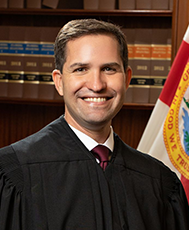A Florida Supreme Court decision has put to rest some questions about whether a statute of limitations on lawsuits can be extended just because the insurance carrier is a party being sued.
It cannot, the court held last week in Tsuji vs. Fleet, a complex case that pitted two Florida appeals court decisions, one by the 1st District Court of Appeal in 2021 and one from the 4th DCA in 1995, against each other.
“We approve the First District’s decision and disapprove the Fourth District’s decision on the applicability of (Florida Statute) section 733.710(1),” Justice John Couriel wrote for the majority in the June 29 opinion.
The Fleet decision has now reinforced the notion that the statute of limitations and/or statute of repose create strict deadlines “and you cannot circumvent those deadlines simply because someone else might be vicariously liable or because there might be liability insurance,” explained Florida insurance attorney Michael Packer, with the Marshall Dennehey law firm.

Simply put, if no negligence suit is filed against the insured within two years of the injury, an insurer can rest easy and close the file, Packer noted.
“Now we know: The rule applies to everyone – it’s two years across the board,” said Boca Raton attorney Josh Beck, who represents insurers in claims disputes.
The case stemmed from a car accident in 2014. Thomas Morton was driving a truck for Lewis Bear Co. of Pensacola, one of the oldest beer distributors in the state, and injured Samantha Tsuji and Crystal Williams in the crash.
Three years later, Tsuji and Williams sued Morton for negligence and Lewis Bear Co. for vicarious liability. Florida law provides a four-year window for claims against living persons, but only a two-year statute for suits against a deceased’s estate. It turned out that Morton had died shortly after the accident of unrelated causes, so the plaintiffs substituted Bart Fleet, who represented Morton’s estate. Their demand for damages was limited to the limits of Morton’s casualty insurance coverage.
The beverage company moved to dismiss, arguing that Florida Statute 733.710(1) requires that claims against an estate must be brought within two years of the death. And because the statute of repose let the estate off the hook, it also exonerated Lewis Bear from vicarious liability, its attorneys argued.
The trial court and the 1st District Court of Appeal agreed.
But the injured plaintiffs pointed to the 4th DCA’s 1997 decision in Pezzi vs. Brown and a subsequent Florida Supreme Court opinion. Those rulings appear to show that another statute, 733.702(4), allows claims to be brought against an estate more than two years after the death if the plaintiff seeks recovery only from the insurance company.
“Nothing in this section affects or prevents….to the limits of casualty insurance protection only, any proceeding to establish liability that is protected by the casualty insurance,” 733.702 reads.
The Supreme Court justices noted that, importantly, part of section 733.702 also makes it clear that nothing in that section “shall extend the limitations period set forth in section 733.710.”
The law provides exceptions, but none of those apply to casualty insurance, the court wrote.
“So we have to decide: is Fleet ‘liable’ under section 733.710(1) given that the petitioners seek only payment from a casualty insurance provider? We decide he is, and that therefore petitioners’ claims are untimely,” the Fleet opinion reads.
The 1st District Court’s 2021 decision in the Fleet case is the correct interpretation of the law, the high court said.
The court also pointed out that a plaintiff cannot join a liability insurer until a judgment against the insured or a settlement has been reached, Packer said. “And if your claim is barred against the insured and you cannot get a judgment against the insured, then you cannot pursue a liability carrier,” he said in an email.
Justice Jorge Labarga dissented from the opinion, contending that neither section of the law bars suit against Morton’s estate. He differed from the majority’s interpretation of legislative intent with the use of the word “liability” in the statutes.
Was this article valuable?
Here are more articles you may enjoy.



 Chubb CEO Greenberg on Personal Insurance Affordability and Data Centers
Chubb CEO Greenberg on Personal Insurance Affordability and Data Centers  Inside the Toxic Legacy of Georgia-Based Mulitbillion-Dollar Carpet Empire
Inside the Toxic Legacy of Georgia-Based Mulitbillion-Dollar Carpet Empire  Florida Insurance Costs 14.5% Lower Than Would Be Without Reforms, Report Finds
Florida Insurance Costs 14.5% Lower Than Would Be Without Reforms, Report Finds  BMW Recalls Hundreds of Thousands of Cars Over Fire Risk
BMW Recalls Hundreds of Thousands of Cars Over Fire Risk 


